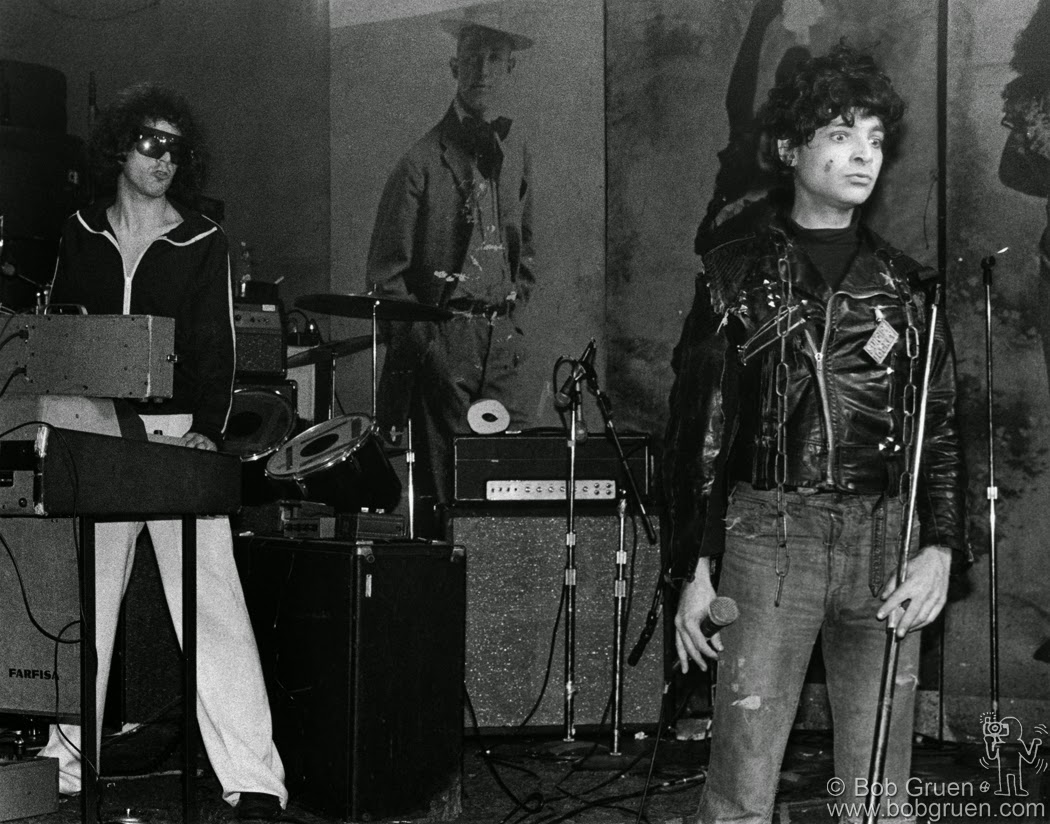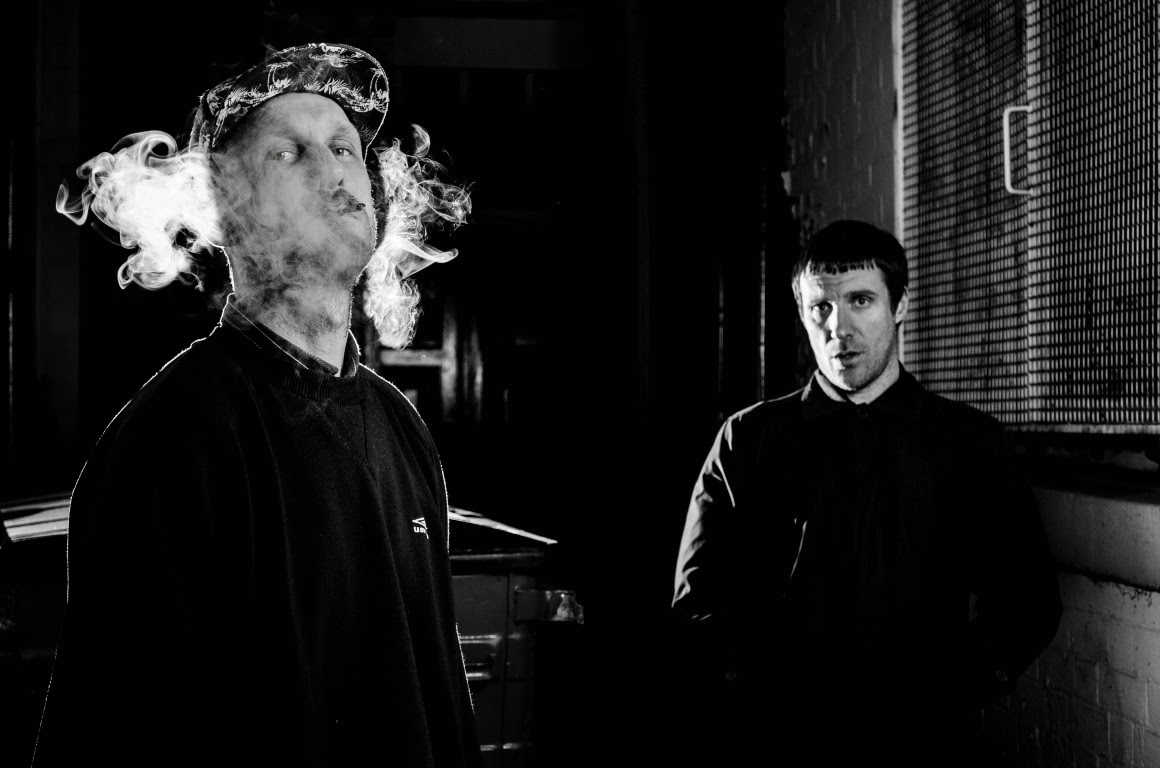TOWARDS the end of
the 60's and early 70's foundations were being laid and seeds planted
by bands like The Stooges and New York Dolls for what would
eventually become known as punk rock. Few bands of this era were as influential as Suicide. The very name is unnerving,
before a note has been played or a word uttered it forces the audience onto
their heels and places them in a state of unease. Then reality
strikes - the street thug leather, the motorcycle chain, their
overtly anti-war lyrics ("America, America is killing its youth" - Ghost Rider) and confrontational
onstage antics. All aligned with the palpable air of violence
that pervaded their music. Everything they did went against the grain, they once
famously said: "People wanted fantasy, we gave them the
streets".
In other words, they
weren't going to sing about the idyllic side of life but the gritty harsh
realities - death, despair, poverty and violence. It is human nature to
be responsive to violence, we are drawn to it in sports and shocked by it in
life, it undeniably provokes reaction. In musical terms, the widespread
fascination with punk rock probably best illustrates this point. Whether
you are a fan of punk or not, you will have formed an opinion based on seeing
Johnny Rotten swearing on TV, Iggy Pop cut himself with broken glass onstage or
footage of violent concerts with spitting fans (and let's not even mention the
grotesquery of GG Allin).
The stooges had that air of menace, New York Dolls commanded respect, later on a lot of the pivotal bands in the hardcore rock scene (who
attempted to push punk rock a step further) channeled anger and discontent.
Suicide lived it, they had danger dripping from their blood-stained leather jackets. They were the first band to use the term punk, distributing flyers for a show called 'Punk Music Mass', prior to that only music journalist Lester Bangs had used the word in an article about The Stooges in 1969. Alan Vega would take to the
stage wild eyed, seeking gratification in goading the audience before him.
He wanted to incite violence or at least provoke some kind of reaction.
In the early days the audience were more than happy to oblige.
"They were riots. I used to jump in the audience and antagonise people. The sound was already antagonising them. We chose not to be entertainers at that time. People came off the street to be entertained by our band and forget their problems for a while but when they came to a Suicide show they got the street right back in their faces and that probably antagonised everybody. All kinds of shit went on stage, plus the way I sang, the way I danced, just attacking the audience physically." - Alan Vega.
They were abhorred by
traditional punk fans who expected and demanded the holy trinity of rock music
which was drums, bass and guitar. An acrimonious approach to live shows stemmed from Vega's introduction to The Stooges. He has pinpointed that
night as a life-affirming moment, which ultimately triggered his decision to
become a performer. He observed Iggy confound and captivate the audience
before him in equal measure.
"It was when I saw Iggy Pop,
that's what did it for me. That
changed my life pretty much...I knew nothing
about the Stooges, and it turns out the next night they were opening up for the
MC5... 1968 or 1969 in the New York State Pavilion Building...I knew nothing
about Iggy, I had no idea what it was all about. I went basically there
to see the band and to see Ronnie Asheton play guitar. And there was
Iggy! And that blew me away! It was just like, I can't be the same anymore, ya
know what I mean? And the last place I ever thought I'd be spending my life was
onstage, ya know what I mean?"
- Alan Vega.
It broke the walls
down for Vega, inspired by Iggy's maniacal performance he realised musicians
didn't have to conform to a set of rules. The whole concept of drums and
guitars, audience and stage could be manipulated to create something which would
be the antithesis to conventional rock music. A sculptor at the
time Vega felt music could be a vehicle in which to express his full artistic
capabilities.
"He broke down the audience/stage thing. He broke it down
completely! It was like an environmental piece of art. He
changed
the whole thing, right then and there, that night. And I realised,
if I'm
gonna be a true artist to myself, I just have to follow in this new
direction...Life is a gamble. And I took a chance, man."
- Alan
Vega on Iggy Pop.
"We weren’t giving them any basis for what they knew. We were kicking their legs out from under the table from all their familiar things that they could rest on, which was the instrumentation, not having guitars and bass and being a two man group, which wasn’t down then."
- Martin Rev.
It was hard to
comprehend at the time,nobody was making music based solely around a
synthesiser and vocals. Punk, as "punks" knew it, was being
dismantled right in front of them. At live shows their
discontent was often manifested through violence. Vega was in his
element, taking the audience to the brink and watching them erupt. At one infamous show in Glasgow in 1978 a fan threw an axe almost decapitating the frontman.
"They hated us. I taunted them
with, 'You fuckers have to live through us to get to the main band.' That's
when the axe came towards my head, missing me by a whisker. It was surreal, man.
I felt like I was in a 3-D John Wayne movie. But that was nothing unusual.
Every Suicide show felt like world war three in those days. Every night I
thought I was going to get killed. The longer it went on, the more I'd be
thinking, 'Odds are it's going to be tonight.'"
- Alan Vega.
Growing notoriety
along with the subversive quality of their music finally gained the band wider
recognition. They never dealt in set lists, or song structure for
that matter. Spoken word lyrics are ad-libbed, often interspersed
with apoplectic screams which pierce the almost suffocatingly
dense drone provided by Martin Rev's primitive drum machine and synthesiser. All the while Vega convulses and swears sporadically. The same approach to live shows exists to this day, defiantly unchanged
in over 40 years. In what will forever be one of the most memorable gigs of my
life, I seen Suicide support The Stooges in London's Hammersmith Apollo in
2010. They were as divisive as ever 40 years on as people gazed on
bewildered muttering "what the fuck is this?", whilst 'Ghost
Rider' pummeled on twice as long as the album version. Forever
outsiders and reveling in it.
Unrestrained, their
extemporaneous musings have become part of punk folklore. Their 1977
self-titled debut album (containing 'Ghost Rider', 'Che' and the
10 minute panic-inducing 'Frankie Teardrop') will forever be regarded as
an eerie proto-punk masterpiece. On reflective songs like 'Cheree'
and 'Dream Baby Dream' (included on the later re-issue of second album Suicide: Alan Vega and Martin Rev) you can hear why Vega was once labelled 'the punk Elvis'. Both Vega and Rev have had
experimental and varied solo careers. Vega has referred to Deuce Avenue as
a sole record of which he is particularly proud.
Europe was first to take the band to heart and recognise their significance. Initially their name was omitted from punk rock chronicles but those wrongs have since been put to right, as they
have deservingly been paid their dues. Modern electronic musicians owe a great debt to the band, they
have paved the way for countless industrial/dance/punk
musicians over the years. Most notably artists such as Steve
Albini and James Murphy (of electro-punk outfit LCD
Soundsystem) have alluded to the weighty impact of Suicide on their own
careers and experimentation. Bruce Springsteen - who
has been a long-time fan - has used 'Dream Baby Dream' as
a lighters-in-the-air set closer whilst touring. To mark Vega's 60th
birthday a list of artists queued up for a tribute album including Grinderman, Primal Scream and Peaches. They continue to experiment and push boundaries through their solo work but their body of work as Suicide will forever have its roots buried deep in the core of punk rock.












